
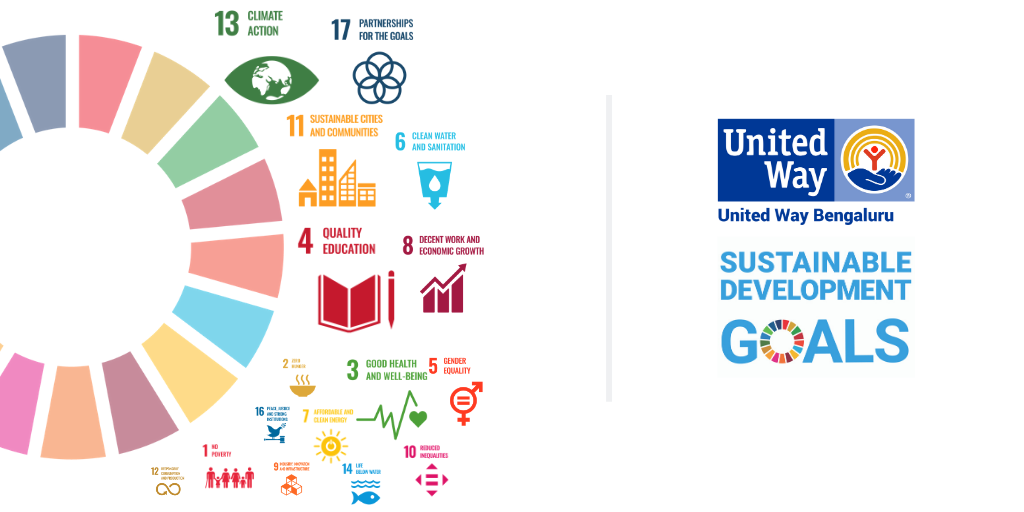
As an NGO, our motto is to mobilize the caring power of the communities for the well-being of the society through various projects and interventions. But UWBe also recognizes the importance of adhering to global parameters of development via these projects as these parameters bring together holistic development and social action. We staunchly believe in incorporating the Sustainable Development Goals in all our interventions. Though the booming global population definitely demands development to keep up with the multiplying numbers, we need to bear in mind that unchecked development can end up in stripping the Earth of all natural resources.
Sustainable Development Goals (SDGs) view a country’s development in a holistic wholesome sense. Due to the federal structure of India, the States and Union Territories play an enormous role in achieving Sustainable Development Goals. United Way of Bengaluru has worked meticulously in the state of Karnataka towards the SDG goals. The SDG India Index and Dashboard 2019-20 report jointly released by NITI Aayog and UN-India details the progress of each and every state and also Union Territories. Karnataka is ranked at the 6th place with 66 out of 100 points. In this article, we will look at how our projects align with the SDG goals and work hand-in-hand with them.
Our projects can be theme-wise divided into 5 categories – Environment Sustainability, Education, Access to Health, Economic Mobility and Disaster Relief. All of them have a dynamic relationship with the SDGs in that they innately aspire towards fulfilling the UN stated parameters.
Firstly, Karnataka tops the goal-wise top performing state for two SDGs – Climate Action and Life Below Water. This achievement is gained collectively through the perseverance and hard work of multiple organizations and the State itself. As part of UWBe’s efforts towards this accomplishment, our flagship program ‘Wake the Lake’ works towards reviving the dying lakes of Bengaluru. This is a multifaceted project born out of the city’s acute water crisis caused by both depleted ground water tables and dying lakes which then resulted in steep decline of bird life. Our lake rejuvenation process emphasizes on the wholesome development of the lake as an ecological unit.
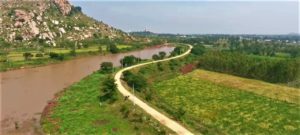
Revival of the Nandi Lake
As is commonly understood, all SDG goals are interconnected since most issues are diverse yet interlinked. Similarly, Wake the Lake project contributes to the development-focused State’s lake rejuvenation with plantations, revival of water bodies and traditional water structures like the Kalyani near lakes, construction of children’s park in the lake premise in order to promote human-lake interaction.
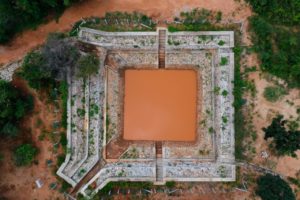
A revived Kalyani
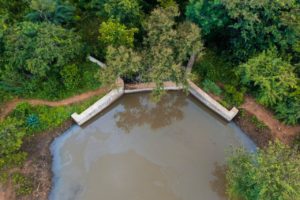
Watershed Project at Bangalore University
Apart from lake-related rejuvenation works, UWBe also works to promote green cover through innovative ways of decarbonization such as Miyawaki forests, Bokashi Balls, seed-ball making, mulching, reviving Gundu Thopus, constructing self-maintainable rainwater harvesting systems at village houses and also Moolika Vanas – all of which works towards building environment sustainability. Each of these become a drop in the ocean in fighting for climate action.
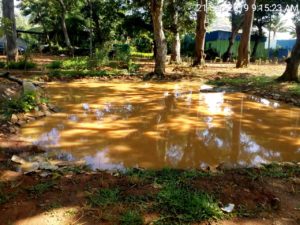
Gundu Thoppu after revival
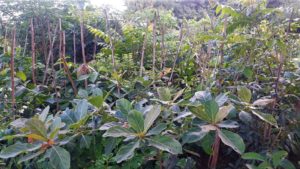
Full grown Miyawaki Forest
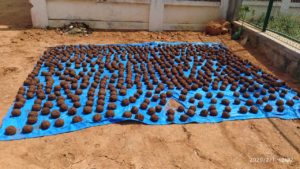
Bokashi Balls keeps the lakes clean
Not just the SDG 13 i.e. Climate Action, but these projects mingle with the other SDGs such as Sustainable Cities and Communities (SDG 11) and Responsible Consumption and Production (SDG 12). The latter SDG comes into play when we consider Gundu Thopus which are village commons woodlots that generate small-scale production of forest products. UWBe is always on the look-out for newer methods of building sustainable communities through sustainable management of natural resources.
SDGs touched upon: Climate Action, Sustainable Cities and Communities, Responsible Consumption and Production
Providing quality education is a mammoth task in India, especially in our current times! It is a critical cause which tops our priority list and demands immediate social action. But our primary focus fell on a much-ignored section within the education sector. With 158.79 million children, 13.1% of India’s population fall below the age of 6 years (GOI, Census 2011). Children’s experiences in early life is responsible for the development of their cognitive, physical, social and emotional skills and thus succeeding in life. This development is further enhanced by supportive family, proper nutrition and health care, and so on. Our Born Learning Campaign seeks to address the needs of this critical age. Our objective is to create school readiness among children of 3-6 years of age through technical-based Early Childhood Education provided at Anganwadi centres. Anganwadis are government pre-school centres. This program seeks to ensure access to a holistic, optimal learning environment for the children which included appropriate health, hygiene and nutrition awareness through the active involvement of the community stakeholders, specifically parent groups. UWBe launched the cyclic BLC Fellowship Training Program across 300 centres where the BLC staff, Anganwadi workers and helpers were trained in capacity building activities.
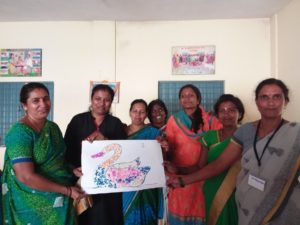
Regular training session of the Anganwadi teachers and helpers
We also integrated cost-effective, native-grown, healthy foods into children’s and in general, the whole family’s diet.
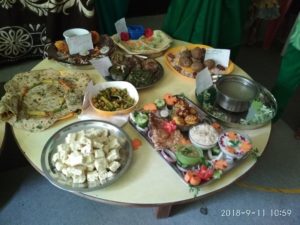
Cost-effective native grown recipes for boosting children’s growth and the family’s too
Mothers also participated in the Poshakshala activity and developed teaching & learning materials with indigenous materials.
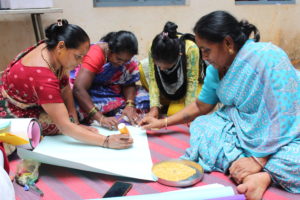
Anganwadi mothers creating Teaching Learning Materials
From 10 Balwadis (currently known as Anganwadis) in 2012, BLC has grown to 730 centres across the country. UWBe becomes Centre of Excellence for Born Learning Campaign across India. The BLC program’s exclusivity to the Anganwadis encourage parents to move from private pre-schooling to cost-effective traditional Anganwadi set-ups. This also ensures mingling of children from various backgrounds which builds good mind-sets in their early ages.
Apart from the 3-6 age group, we also work in the primary education of school going children. At schools, we helped create Sikshana Student Clubs where students learn from each other through peer-teaching relationships so as to create a culturally rich environment. At the higher education levels, we focus emphasizes on skill-building initiatives for school drop-outs and those who are unable to find a place in mainstream education to get skilled thus leading to future sustainable employment. Apart from providing scholarships for economically backward but meritorious college-going students, we train youth under 5 domains of skill development – Assistant Beauty therapy, Industrial Sewing, Machine Operations, Food & Beverages, Retail Management and Customer Relationship Management – and they are placed with an average salary of Rs 15,000 per month.
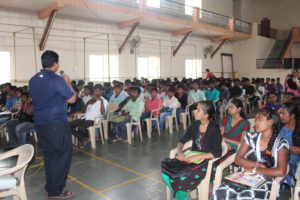
Hundreds of youth being trained for skill development
SDGs touched upon: Quality Education, Gender Equality, Good Health and Well-Being, Reduced Inequalities
Economic mobility focuses on building sustainable income and livelihood models for the lower-income and marginalized families. In forging sustainable livelihood models, we have focused heavily upon women.
One of our key activities was to promote sustainable means of financial income through the creation of Farmers Producers Organization (FPO) in Yelesandra Panchayath, Kolar district. While the men come to Bangalore in search of daily wage jobs, the women left behind remain jobless or have only seasonal employment. Here, we introduced Self Help Groups (SHGs) as part of FPO for women to raise awareness on self–employment options such as vegetable cultivation and selling, tamarind and jackfruit processing.
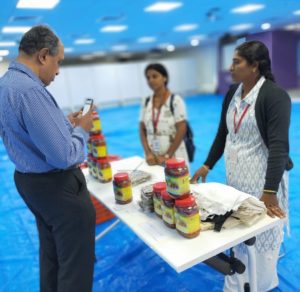
Pickle made by the SHG women are sold directly to the corporates
Similar SHGs were set up at Doddaballapur to build the capacities of SHG women on book keeping, financial transactions, savings and banking services. They were also supported through Entrepreneurship Awareness and Development Programs (EAP and EDP) to motivate them to take up micro-enterprises. As part of the SHG programs for women at Lakkur, Doddaballapur and Sompura, we have also provided them with items like sewing machines and other microenterprise related items. Here, we have tried to provide women with livestock such as pregnant goats. When these goats give birth, the beneficiary has to give one of the parent goats to another beneficiary. In return, she will get a good sum and also the money from selling the goat kids.
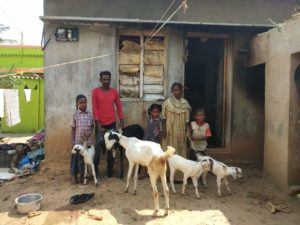
Bhagyamma, a beneficiary of the goat rearing project
Yet another project that needs to highlighted is our effort in creating sustainable employment to doubly marginalized rural transgender community (gender and region wise) through dairy farming. We provided them with dairy farming training and equipment, 2 cows and a buffalo for the farm’s setting up.
Touching upon multiple SDG goals, our project concerning this community’s livelihoods is the need of the hour as creating sustainable employment in rural areas reverses urbanization. It will not only ease the weight of population concentrated in urban cities but also strengthen the rural thus slowing down rapid urbanization.
All of the measures undertaken have the factor of sustainability built into the fabric of the projects.
SDGs touched upon: Decent Work and Economic Growth, Gender Equality, Sustainable Cities and Communities
Public Health Care is definitely essential. When it comes to rural areas, it is all the more important for the inhabitants to access healthcare.
We have worked extensively in Doddaballapur in providing access to healthcare by introducing the Mobile Health Clinic van, equipped with a medical team of a doctor, a nurse, helper and the van driver. The van visits villages regularly, provide health services and referrals while spreading awareness on health and hygienic practices. Greater awareness about skin infection and allergies has resulted in reduced incidences. Superstitious beliefs linked to diseases were also dispelled due to the sustained efforts by the doctor and a social worker in spreading awareness to the villagers.
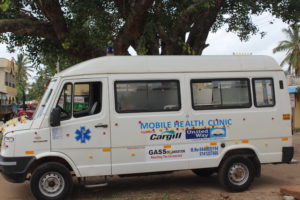
Mobile Health Clinic
We have also delved into nutrition programs at all Anganwadi centres. What goes in is crucial in avoiding unnecessary diseases and health issues. We help the Anganwadi children’s mothers understand concepts of food safety and the hygienic practices to be followed in the making of meals.
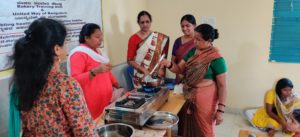
Session on healthy food consumption habits to mothers
We also fund the MILANA charitable service organization to carry on their crucial work for the well-being of the PLHIV community in every way possible. They also provide medical, nutrition and educational support for HIV infected children. They believe in helping PLHIV fight against the society’s stigma towards them.
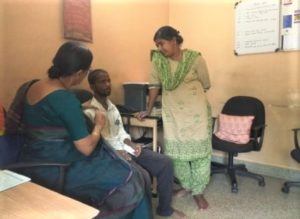
HIV patient undergoing counselling
SDGs touched upon: Good Health and Well-being, Reduced Inequalities
Disaster Relief is crucial in terms of regaining our lost foothold. Disaster Relief encompasses a variety of SDGs such as clean water and sanitation, poverty, health, education and so on. Our work becomes multilayered.
In the aftermath of the disaster, we assess the damage by collecting data from government and other agencies working in the location. Soon after, we map our stakeholders, list out the immediate and long term requirements and draw an estimated budget prior to seeking support. We cover activities such as school and Anganwadi refurbishment, livelihood support and refurbishment of PHC units and houses. We provide support for women fish vendors, salt vendors, small shops, constructed bunk shops for the disabled and supplied goats/sheep for rearing as means of earning an income. In addition, we also carry out plantation, built pipe composting units and kitchen gardens.
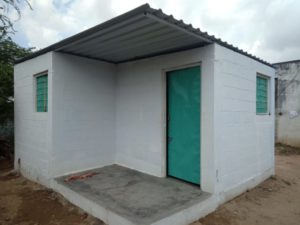
A rebuilt house
Kerala, Kodagu, Assam, Tamil Nadu and Orissa are some of the disaster-hit places that we have worked upon extensively.
SDGs touched upon: Good Health and Well-being, Clean Water and Sanitation, Decent work and Economic Growth, Quality Education, Sustainable Cities and Communities
As an organization, we seek to work hard and strive further to align our efforts with the Sustainable Development Goals for maximum output.



